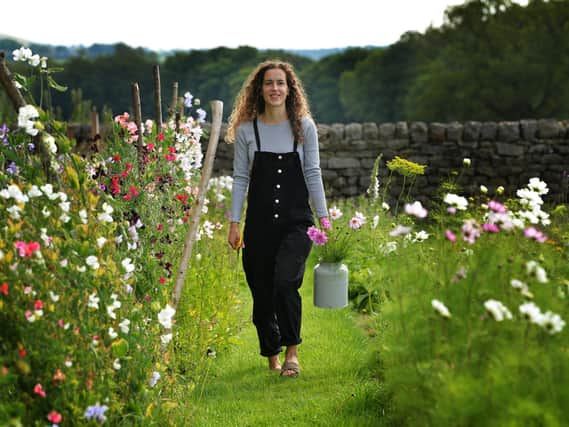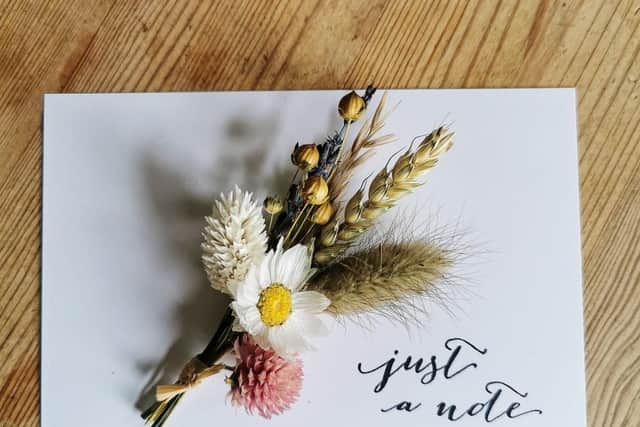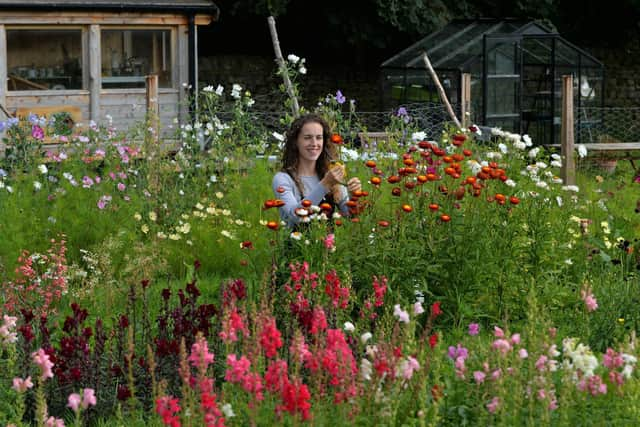Meet Otley's Allotment Florist who gave up acting for a career with flowers


Sometimes life takes a different path, or one through a meadow in her case. The Allotment Florist is the name of the ethical floristry business she set up in London in 2016.
Two years ago, she brought the show back home to Yorkshire when she and her husband, Jack, moved to Otley. Helena loved London but after 10 years she is thrilled to be back in Yorkshire. “It’s just so beautiful, especially where we are,” she says.
Advertisement
Hide AdAdvertisement
Hide AdThe hallmark of her work is that her arrangements look as if they have just been picked or foraged from the English countryside.


“It’s very wild and natural,” she says. “I always tell people you should be able to see the negative space between the flowers. Don’t crowd all the flowers in just because you’ve got them. If you think the arrangement is finished, it probably is finished.”
The trick is to move with the natural shapes rather than forcing the flowers to sit a certain way.
Asked if she still misses acting, Helena, 33, says: “Yeah, massively. Many of my friends are still acting and a lot of them have done so well, but I never wish that could have been me. I just miss it when I go to the theatre. But acting is so brutal, such a cut-throat business. I tried to get into drama school for four years and kept getting through to the final round and then not getting in.”
Advertisement
Hide AdAdvertisement
Hide AdLooking back, she wonders if she didn’t want to be an actor enough. “I remember my friend who’s quite a famous actress, Geraldine James, she was in a lot of things when she was young. She was like, ‘Don’t give up, don’t give up’.”


In the end, though, she felt acting wasn’t quite right for her.
Helena grew up in Roundhay in Leeds, the youngest of four and the only girl. She studied art in the city, before moving to London, swapping art for acting.
When the acting didn’t work out, she found solace in her allotment in north London, where she grew fruit and veg. “A few flowers but mainly food, because I wanted to be sustainable, but then the flowers started to creep in, and I thought maybe I could grow all flowers.”
Advertisement
Hide AdAdvertisement
Hide AdThose allotment flowers led Helena to take up a formal training at the Covent Garden Academy of Flowers, where she learned how to run a floristry business. Afterwards she worked for florists around London, including Jane Packer and Grace & Thorn.
Working for a florist is the best training, she says, as it shows the business isn’t just “flouncing about for hours with flowers”. Yet she felt uneasy about seeing flowers flown in from around the world. That is why she grows her own flowers organically or buys British flowers locally when she cannot grow enough.
Acting might be hard, but so is being a florist. “It’s a tough job. It’s physical and I don’t think people realise that. You’re lifting huge vases in and out of weddings, and it’s tiring.”
Growing flowers isn’t easy either. “You’ve got to be there late at night watering, and early in the morning to harvest stuff. I wouldn’t change my job but it’s hard work. But it’s also amazing and you get so much reward and it’s so lovely working with something so beautiful.”
Advertisement
Hide AdAdvertisement
Hide AdHelena’s business was settling in nicely before the pandemic hit. She had popped up on BBC2’s Gardeners’ World in an item that was shown again recently and was working with fashion brands.
Then there was the Chelsea Flower Show, where shop windows in the King’s Road are turned into flowery sets. “It’s a huge thing and some shops go full out. I had all these cool jobs booked and I was meant to be dressing the & Other Stories window. It was a big, exciting gig and then it was cancelled.”
Like many others, Helena had to reinvent herself. “When they shut everything down, I think I lost about 15 grand in four days.” Jobs were cancelled and weddings were cancelled almost overnight, so she needed a plan. It came in the shape of a packet of wildflower seeds.
“That was the first product I launched and that went totally bonkers. I think it was just the right time to launch something like that because everyone was at home.”
Advertisement
Hide AdAdvertisement
Hide AdShe introduced dried flower products, including picture frames, and Christmas gifts. Planned workshops were postponed, but she moved some online, sending flower-arranging kits out to those who wanted to bloom on Zoom.
Now Helena is back teaching in person. She doesn’t have a shop in Otley, preferring to run her business online. Her base is a paddock on the Farnley Estate, where she grows her flowers. She is having a wooden classroom built there for her classes and workshops.
“It’s in such an amazing location. I’ve got a view of Almscliffe Crag from the field – it’s pretty awesome.”
Since they moved north, Jack has a job running a graphics department at Channel 4 in Leeds. They were officially married in London as that’s where they met, but recently held a Yorkshire wedding.
Advertisement
Hide AdAdvertisement
Hide Ad“We had a proper wedding in Walton, a tiny village outside Wetherby. It was lovely and there’s a great village hall there that used to be an old school. They’d never done a wedding there and it’s a perfect venue. We did everything ourselves. It was a totally DIY wedding.”
And, yes, she chose her own flowers. “I didn’t have many flowers, just special ones I had wanted for a long time. Choosing your own flowers is hard if you’re a florist.”
Asked if she has a favourite flower, she says: “I don’t really like roses that much, although I like a proper garden rose. I really like butterfly ranunculus. A lot of my work is texture based, so I like lots of different types and textures. I am very into grasses, and bracken in the autumn.”
Her arrangements can contain foraged elements – “things you wouldn’t think to use, like all the cow parsley. It’s dried now and looks amazing, and you can reuse that at Christmas.”
Advertisement
Hide AdAdvertisement
Hide AdAs for growing her own, dahlias are tricky as she won’t use pesticides and rabbits romp through her paddock; phlox are difficult, too.
“You germinate them in the dark and they’re fiddly. I managed to grow about five and they’re so beautiful. The bog-standard ones are pink but then there are all these beautiful colours, caramel tones, and they are worth growing.”
Helena tries not to use Oasis, the light brick that supports many arrangements. “Everybody used to use it all the time. It is an amazing thing and makes life so much easier – it holds water so well.”
She opts for “foam-free mechanics” instead. “There are ways of doing anything, you just have to work it out,” she says.
www.theallotmentflorist.co.uk